|
|
|
Sort Order |
|
|
|
Items / Page
|
|
|
|
|
|
|
| Srl | Item |
| 1 |
ID:
154525
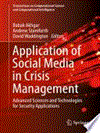

|
|
|
|
|
| Publication |
Switzerland, Springer Nature, 2017.
|
| Description |
xvi, 236p.hbk
|
| Series |
Transactions on Computational Science and Computational Intelligence
|
| Standard Number |
9783319524184
|
|
|
|
|
|
|
|
|
|
|
|
Copies: C:1/I:0,R:0,Q:0
Circulation
| Accession# | Call# | Current Location | Status | Policy | Location |
| 059142 | 303.4833/AKH 059142 | Main | On Shelf | General | |
|
|
|
|
| 2 |
ID:
189425
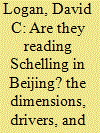

|
|
|
|
|
| Summary/Abstract |
Experts increasingly highlight the dangers of nuclear-conventional entanglement, particularly in the U.S.-China context. This article develops a framework for assessing entanglement and its risks. Applying that framework to China, it finds that Beijing’s missiles are not as entangled as is sometimes feared, but ongoing trends may increase future entanglement. It also presents evidence that, counter to the prevailing wisdom, Chinese entanglement has not emerged as a strategic policy choice but, rather, as the byproduct of more parochial organizational dynamics. Strategic signaling and perception management will be key to controlling escalation risks stemming from nuclear-conventional entanglement in China.
|
|
|
|
|
|
|
|
|
|
|
|
|
|
|
|
| 3 |
ID:
005019
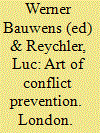

|
|
|
|
|
| Publication |
London, Brassey's, 1994.
|
| Description |
xv, 218p.
|
| Series |
Brassey's Atlantic Commentaries;7
|
| Standard Number |
85753-105-1
|
|
|
|
|
|
|
|
|
|
|
|
Copies: C:1/I:0,R:0,Q:0
Circulation
| Accession# | Call# | Current Location | Status | Policy | Location |
| 036088 | 303.69/BAU 036088 | Main | On Shelf | General | |
|
|
|
|
| 4 |
ID:
130636
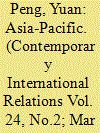

|
|
|
|
|
| Publication |
2014.
|
| Summary/Abstract |
The ability to build a new model of major-nation relations will hinge upon the long-term
peaceful cooperation between China and the United States. The author proposes a
roadmap to solve five problematic issues. All of these are essential for China and the U.S.
to co-exist peacefully and cooperate well in the Asia-Pacific region.
|
|
|
|
|
|
|
|
|
|
|
|
|
|
|
|
| 5 |
ID:
027583


|
|
|
|
|
| Publication |
London, Brassey's (UK), 1990.
|
| Description |
xii,138p.
|
| Standard Number |
0080403743
|
|
|
|
|
|
|
|
|
|
|
|
Copies: C:1/I:0,R:0,Q:0
Circulation
| Accession# | Call# | Current Location | Status | Policy | Location |
| 032212 | 327.17/GOL 032212 | Main | On Shelf | General | |
|
|
|
|
| 6 |
ID:
061064
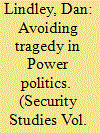

|
|
|
|
|
| Publication |
Winter 2003-04.
|
|
|
|
|
|
|
|
|
|
|
|
|
|
|
|
| 7 |
ID:
178224
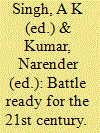

|
|
|
|
|
| Publication |
New Delhi, Pentagon Press, 2021.
|
| Description |
xii, 284p.hbk
|
| Standard Number |
9789390095261
|
|
|
|
|
|
|
|
|
|
|
|
Copies: C:1/I:0,R:0,Q:0
Circulation
| Accession# | Call# | Current Location | Status | Policy | Location |
| 060008 | 355/SIN 060008 | Main | On Shelf | General | |
|
|
|
|
| 8 |
ID:
112437
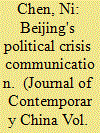

|
|
|
|
|
| Publication |
2012.
|
| Summary/Abstract |
This article explores how the Chinese government managed the 2009 Xinjiang riot through communications. To reconcile Western crisis communication concepts with the Chinese case, this study examines the government communications via news conferences during the riot. It finds that government communication functions only at operational and tactical levels but fails to play a strategic role in crisis management. This is so partly because government public relations have not yet been fully institutionalized. It also notes the differences between the government's handling of a political crisis (the Xinjiang riot) and of a natural disaster (the Sichuan earthquake).
|
|
|
|
|
|
|
|
|
|
|
|
|
|
|
|
| 9 |
ID:
168478
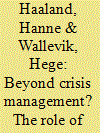

|
|
|
|
|
| Summary/Abstract |
In recent years, what has been called citizen initiatives for global solidarity (CIGS) have grown considerably in numbers across Europe and beyond. Lately, CIGS have also received attention as they are responding to humanitarian crisis across the world. In Europe during 2015, citizens were heavily involved in catering for incoming refugees, putting up loosely organised voluntary-based initiatives. CIGS popped up in places such as Lesvos, which is the focus of our research. Humanitarian CIGS are quick in their response to needs on the ground, are quickly governed by rules and regulations as well as overall ideas about crisis management, and come to work either with or in opposition to other actors. We examine two examples of CIGS positioned at the margins of the humanitarian aid machinery in Lesvos. Through a lens of power and resistance, we discuss how they resisted paradigmatic ideas of crisis management and instead called for a different interpretation of how to think about and do crisis management.
|
|
|
|
|
|
|
|
|
|
|
|
|
|
|
|
| 10 |
ID:
147840
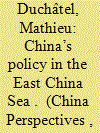

|
|
|
|
|
| Summary/Abstract |
This paper looks back at China’s policy towards the establishment of a crisis management mechanism with Japan in the East China Sea from the beginning of the negotiations in 2008 to the deadlock reached at the end of 2015. During this period of seven years, China moved from being a reluctant negotiator to interrupting the negotiations and finally accepting their resumption, but only after setting such a high bar in terms of relative sovereignty gains that the talks unravelled. The paper argues that the socialisation of China to confidence-building norms in the security sphere – norms that the strategic community of the PRC traditionally rejects – is making very slow progress despite the rising risk of incidents in maritime East Asia. It concludes that Chinese foreign policy uses crisis management negotiations to secure a variety of foreign policy goals linked to sovereignty and balance of power rather than a tool purely dedicated to building security and stability by freezing an existing status quo.
|
|
|
|
|
|
|
|
|
|
|
|
|
|
|
|
| 11 |
ID:
192100
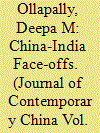

|
|
|
|
|
| Summary/Abstract |
This article examines five direct border conflicts between China and India to study how well the reputational effects of their crisis management conformed to conventional deterrence expectations. This article finds that how these crises are settled suggests that instead of deterrence expectations of resolve-oriented behavior, China and India have engaged in reassurance-oriented behavior. Answering why reassurance has taken precedence over resolve even under crises conditions, it is argued that despite the two countries being at odds on the specific and highly salient border issue, they recognize the value of broader joint gains, which in turn is buttressed by a shared ‘post-colonial’ identity and common worldview on questions of global order.
|
|
|
|
|
|
|
|
|
|
|
|
|
|
|
|
| 12 |
ID:
132953
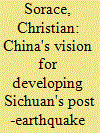

|
|
|
|
|
| Publication |
2014.
|
| Summary/Abstract |
In the aftermath of the 2008 Wenchuan earthquake, government officials, scholars and outside observers eagerly hoped that the emergency relief and reconstruction process would bring about the emergence of civil society and increase grassroots democratic participation. Contrary to this optimistic assessment, this article contends that the local state used the opportunity of the disaster as an experimental laboratory to implement an array of already existing national development plans. The urgency with which the reconstruction was to be completed and the opportunities to meet national development targets as well as access reconstruction funds were too tempting to resist. However, the ham-fisted Leninist implementation style met with local resistance and has contributed to a significant deterioration in local state-society relations. The fact that many local residents continue to question why, despite the huge resources invested by the state in the reconstruction project, they have yet to see any improvement in their economic and overall living conditions points to a deficit of local participation and a breakdown in political communication and trust. By focusing on the different political economies of disaster reconstruction, this article attempts to illuminate the regime's vision for developing the countryside, rural politics, and state-society relations in China more broadly. Unless the state is able to incorporate local needs into its development plans, it will not win the trust and support of local residents, regardless of the amount of money it invests or the benevolence of its intentions.
|
|
|
|
|
|
|
|
|
|
|
|
|
|
|
|
| 13 |
ID:
178453
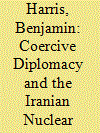

|
|
|
|
|
| Summary/Abstract |
Coercive diplomacy was utilized by a coalition of the United States, United Kingdom, France, Russia, China and Germany (collectively known as the P5+1) to negotiate an end to the Iranian nuclear crisis from 2002–2013. Eventually, this approach culminated in the Geneva interim agreement and the Joint Comprehensive Plan of Action in November 2013 and October 2015, respectively. This article charts the course of the P5+1’s coercive diplomacy efforts against Iran and demonstrates that coercive diplomacy pressured Iran to a point where the cost of continued resistance was too high to continue enduring. It shows that a combination of factors succeeded after 11 years of a coercive diplomacy strategy. These findings will have implications for policymaking and academia, as it is a rare illustration of successful, coalitional coercive diplomacy.
|
|
|
|
|
|
|
|
|
|
|
|
|
|
|
|
| 14 |
ID:
144055
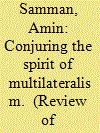

|
|
|
|
|
| Summary/Abstract |
In recent years, critical scholars have emphasised how the recollection of past events as traumas can both constrain and widen the political possibilities of a present. This article builds on such research by suggesting that the management of contemporary financial crises is reliant on a ritual work of repetition, wherein prior ‘crisis’ episodes are called upon to identify and authorise specific sites and modes of crisis management. In order to develop this argument, I focus on how past crises figure within the public pronouncements of four key policymaking organisations during the financial instability of 2007–9. I find that while the Great Depression does enable these organisations to reaffirm old ways of managing crises, both it and the more recent Asian crisis are also made to disclose new truths about the evolution of multilateralism as a form of governance. In so doing, I argue, these historical narratives reveal how the management of global financial crisis depends upon a kind of ‘magic trick’. Rather than a strictly rational, historical process of problem solving, contemporary crises are instead negotiated through a contingent and self-referential conjuring of crisis-histories.
|
|
|
|
|
|
|
|
|
|
|
|
|
|
|
|
| 15 |
ID:
166772
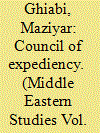

|
|
|
|
|
| Summary/Abstract |
Giorgio Agamben argues that in contemporary governance the use of ‘emergency’ is no longer provisional, but ‘constitutes a permanent technology of government’ and has produced the extrajudicial notion of crisis. The engendering of ‘zones of indistinction’ between the law and its practice is what Agamben defines as a ‘state of exception’. This article adopts the notion enunciated by Agamben and revisits it in the Islamic Republic of Iran. There, the category of crisis has been given, firstly, a juridical status through the institution of maslahat, ‘expediency’, interpreted in a secular encounter between Shica theological exegesis and modern statecraft. Secondly, crisis has not led to the production of a ‘state of exception’ as Agamben argues. Instead, since the late 1980s, a sui generis institution, the Expediency Council, has presided and decided over matters of crisis. Instead of leaving blind spots in the production of legislative power, the Expediency Council takes charge of those spheres of ambiguity where the ‘normal’ – and normative – means of the law would have otherwise failed to deliver. This is a first study of this peculiar institution, which invites further engagement with political phenomena through the deconstruction and theorization of crisis politics.
|
|
|
|
|
|
|
|
|
|
|
|
|
|
|
|
| 16 |
ID:
073573
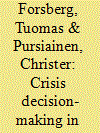

|
|
|
|
|
| Publication |
2006.
|
| Summary/Abstract |
This article reviews 17 Finnish crises since the Second World War from a perspective of three sets of questions derived from the theoretical literature. The questions deal with the construction of crisis, formation of the decision-making unit and rationality of decision-making. Although it is not possible to find a fully regular pattern of a particular type of crisis behaviour, some general observations can be made. In Finland, decision-making is often left in the hands of a small elite group, except in the case of civilian emergencies when key decisions are made at the operational level. The political elite, including the business community, have been fairly united and have rejected critical opinions during a crisis. Yet, contrary to some assumptions about the government using 'crisis' as a vehicle for acquiring more power, Finns generally avoid defining difficult situations as a 'crisis', instead reacting to them cautiously rather than in panic.
|
|
|
|
|
|
|
|
|
|
|
|
|
|
|
|
| 17 |
ID:
037633
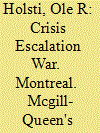

|
|
|
|
|
| Publication |
Montreal, McGill-Queen's University press, 1972.
|
| Description |
290p.
|
| Standard Number |
0773501177
|
|
|
|
|
|
|
|
|
|
|
|
Copies: C:1/I:0,R:0,Q:0
Circulation
| Accession# | Call# | Current Location | Status | Policy | Location |
| 010653 | 327/HOL 010653 | Main | On Shelf | General | |
|
|
|
|
| 18 |
ID:
110298
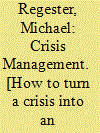

|
|
|
|
|
| Publication |
London, Hutchinson Business, 1987.
|
| Description |
160p.Hbk
|
| Standard Number |
0091688809
|
|
|
|
|
|
|
|
|
|
|
|
Copies: C:1/I:0,R:0,Q:0
Circulation
| Accession# | Call# | Current Location | Status | Policy | Location |
| 029157 | 658.4/REG 029157 | Main | On Shelf | General | |
|
|
|
|
| 19 |
ID:
118518
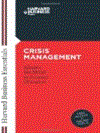

|
|
|
|
|
| Publication |
Boston, Harvard Business School Press, 2004.
|
| Description |
ix,138p.pbk
|
| Series |
Harvard Business Essentials Series
|
| Standard Number |
9781591394372
|
|
|
|
|
|
|
|
|
|
|
|
Copies: C:1/I:0,R:0,Q:0
Circulation
| Accession# | Call# | Current Location | Status | Policy | Location |
| 057109 | 658.4056/HAR 057109 | Main | On Shelf | General | |
|
|
|
|
| 20 |
ID:
034363
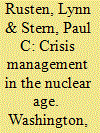

|
|
|
|
|
| Publication |
Washington, D C, National Academy Press, 1987.
|
| Description |
xi, 43p.
|
|
|
|
|
|
|
|
|
|
|
|
Copies: C:1/I:0,R:0,Q:0
Circulation
| Accession# | Call# | Current Location | Status | Policy | Location |
| 028829 | 327.16/RUS 028829 | Main | On Shelf | General | |
|
|
|
|
|
|
|
|
|